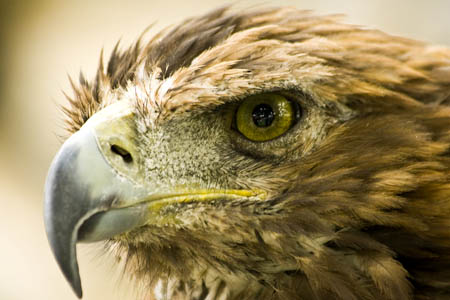Police are appealing for the public’s help after a golden eagle was poisoned on the west coast of Scotland.
The bird’s body was found in March near Morar, south of Mallaig, and tests have established the cause of death as banned pesticides.
The eagle had been bred in a habitat management area created by Scottish Power Renewables beside Beinn an Tuirc windfarm on the Kintyre peninsula and was fitted with a satellite tracking device in 2010.
The incident is the third known eagle poisoning in the area the last 10 years, two white-tailed eagles having suffered the same fate.
Ian Thomson, head of investigations for the Royal Society for the Protection of Birds Scotland said: “Despite the hard work being done by the police and partner agencies, some individuals continue to disregard the law, and public opinion, by killing protected birds of prey.
“Sadly, this is just the latest in a long list of golden eagles found poisoned over the last few years, and that only represents those actually discovered. Who knows how many of these magnificent birds are killed but never found?
“We condemn the actions of those who continue to kill Scotland’s birds of prey, and hope that anyone with information related to this or other wildlife crimes will step up and pass this to the police or contact Crimestoppers.”
Chief Inspector Matthew Reiss, Northern Constabulary’s wildlife crime coordinator said: “Wildlife tourism is an increasingly significant income generator in the highland economy, and particularly so in the west Lochaber area of the Highlands.
“Poisoning is indiscriminate. It could be your pet dog, or even a human, that could be killed simply by contact with such illegal poisons. This is a completely unacceptable and illegal practice.
“People who use illegal poisons are threatening the economy by killing the very wildlife that people visit the area to enjoy viewing.
“These visitors are contributing significant spending in the area, so crimes such as this are also threatening the jobs of people directly and indirectly reliant on the income derived from wildlife tourism.”
PC Charlie Everitt of the national wildlife crime unit added: “The poisoning of this golden eagle demonstrates how indiscriminate this practice is and flies in the face of the steady work currently being undertaken by the Partnership for Action against Wildlife Crime.
“All raptor poisoning cases will continue to be fully investigated.”
Peter Robson, ecologist at Scottish Power Renewables, on whose land the bird was reared, said: “We were saddened and disappointed to find out that one of the golden eagles from Beinn an Tuirc had been poisoned.
“The habitat restoration project at the windfarm has been a great success, producing four healthy golden eagle chicks in a short period of time following a long run of barren years.
“The data from the tracking device was providing experts with a unique insight into the movement patterns of golden eagles during their early years. It is a sad loss, and a setback for all those involved in the conservation of golden eagles in Scotland.”
Anyone with information relating is urged to contact Crimestoppers on 0800 555 111 or Northern Constabulary on 01463 715555.
- A gamekeeper has been fined after a hillwalker found a dead buzzard in a trap on a Perthshire estate.
Three crow traps on the Glen Lyon estate were found to contain the buzzard’s body, that of a sparrowhawk and two chaffinches.
Jonathan Smith Graham pleaded guilty to using the trap and allowing the buzzard to starve to death. His not guilty pleas to two other charges were accepted by Perth Sheriff Court.
Sheriff Robert McCreadie said: “This case involved a dereliction of duty to wild birds. You did not act as a reasonably competent gamekeeper. The buzzard has been endangered and is only now making its way back from relentless persecution.”
RSPB Scotland welcomed the sentence. Ian Thompson said: “We welcome the conviction of Mr Graham and the strong comments made by the sheriff.
“This latest case illustrates, yet again, the lax approach taken by some gamekeepers to following the licence conditions laid out by the Scottish Government.
“The use of these licences is a privilege, and with this comes responsibility. Mr Smith clearly did not take his responsibilities regarding use of these traps seriously and has now lost that right.”
Graham was fined £450. Sheriff McCreadie said the fine was appropriate for the gamekeeper and would deter others.
